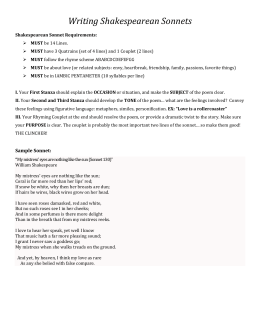
The rhetorical structure of Sonnet 130 is important to its effect, and punch line. And perhaps his honesty was more appreciated anyway. He refuses to glorify, but that doesn’t mean he loves the woman any less.

In the final two lines, known as the turn, Shakespeare says that even though his love isn’t what other people fictionalize in their poems and sonnets, his love is rare and therefore just as important. Lucky for Shakespeare, there are two more lines. In lines six through twelve you learn that her cheeks aren’t like roses, her breath doesn’t smell like perfume, her voice doesn’t sound like music, and she doesn’t float goddess like when she walks. According to lines one through four of the sonnet, Shakespeare’s mistress’ eyes are not like the sun, her lips are not red, her breasts are not snow white, and her hairs are black wires. Shakespeare uses honesty, not flattery, to speak of the woman he loves. This is Shakespeare’s way of speaking against the use of cliché’s of conventional beauty, which eloquently liberates women from stereotypes of superficial beauty, and draws attention to our mind and inner splendor. Shakespeare uses a variety of negating similes, imagery, theme, and structure to make his point. He is after all, just a man looking for meaningful companionship. We all want someone that understands us, and Shakespeare is no different. He makes it clear that the object of his affection does not have to be the classic depiction of beauty, but that it matters more to him that there is a deep personal connection. Perfection is not something he is interested in it bores him.

He understands that a perfect woman does not exist. Shakespeare illuminates the absurdity of deifying a human being.

Women are made out to be divine angel-like creatures who have Most love poems portray a woman as the epitome of perfection. William Shakespeare’s “Sonnet 130”, was written as a mockery of the traditional love poem.


 0 kommentar(er)
0 kommentar(er)
